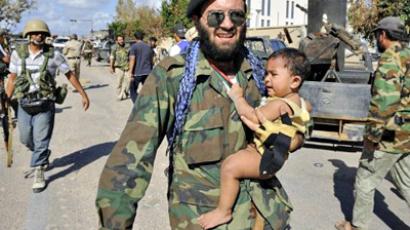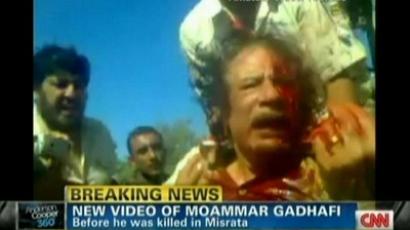Libya: is it the end or just the beginning?
With Libya’s liberation to be officially announced on Sunday and NTC loyalists continuing to celebrate the downfall of Gaddafi’s regime, the question of Libya’s future is rearing its head. And for some it is obvious NATO will not leave so fast.
The liberation is to be declared on Sunday in the city of Benghazi, and not in the capital Tripoli, interim government officials have announced. The chairman of the ruling National Transitional Council, Mustafa Abdel Jalil, will make the declaration.The celebrations of Gaddafi’s death are still continuing in Tripoli. As RT’s Anissa Naouai reports from the Libyan capital, the situation there remains tense and is still very chaotic. “Lots of people are honking their horns and have their lights on. People are still shooting into the air,” she reports.But along with the loud celebrations, the people are asking question which is also being asked now by many global analysts: what’s next for Libya?Meanwhile, NATO plans to end its mission in Libya on October 31, but will issue a formal decision next week after consulting the United Nations and Libya’s interim authorities, NATO chief Anders Fogh Rasmussen said on Friday.“And I find it is questionable that NATO will do that,” journalist and author Susan Lindauer told RT. “I do not believe this war is over. The Libyan people are not going to stop fighting until NATO leaves the country.”
The director of the Transform Centre for Conflict Analysis, Ahmed Badawi, supports this kind of scenario, suggesting that the “mission of NATO probably will be transformed now.”“The Libyan army will have to be somehow reconsidered. There has to be a lot of security training and maybe NATO will find this a good opportunity to maintain some kind of presence in Libya while transforming its mission from protecting civilians into some kind of long-term operation with the Libyan armed forces,” he told RT.
“You will see the new Libyan government requesting NATO to keep some troops on for training,” agrees war correspondent Eric Margolis.He also believes that killing Gaddafi was “a convenient end to Gaddafi and his family”.
“There will be tussling for power between European powers, particularly, the French, the Italian and British, to see who is going to become the dominant voice in Libya,” believes journalist Eric Margolis. “Nobody cares in Libya about democracy. What they care about is oil, business contacts and arms contracts from the new Libyan government,” he told RT.Margolis says that it all reminds him of "the old pirate thing from the Caribbean: dead men tell no tales.”“And Gaddafi and his family had a lot of tales to tell about foreign involvement,” Margolis said.














